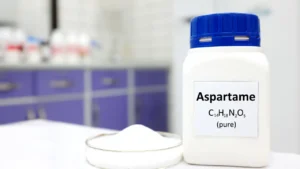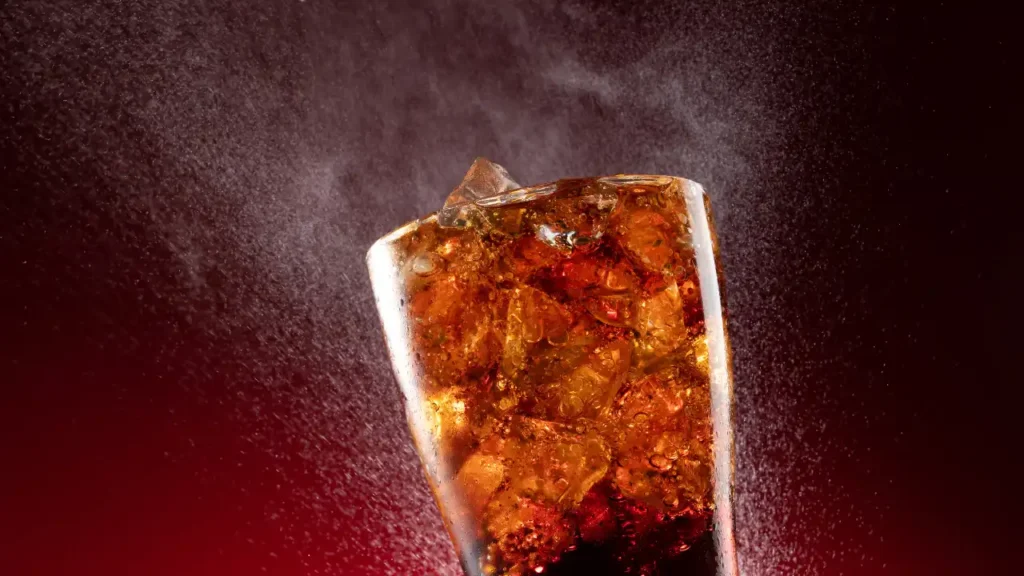Ever cracked open a can of diet cola, marveled at its fizzy refreshment, and thought, “Is this really calorie-free?” You’re not alone. With its bold “zero-calorie” label, diet soda has become a guilt-free favorite but there’s more fizz beneath the surface.
In this blog, we’re popping the tab on what those labels actually mean and how aspartame, serving size, and even chemistry play a role.
How Many Calories Are in Diet Cola?
A standard 12-ounce can of diet cola contains 0 calories, according to major brands like Coca-Cola and Nutritionix. However, trace ingredients like aspartame and preservatives may contribute minuscule amounts typically less than half a calorie per can. For all practical purposes, diet cola is considered a zero-calorie beverage.
What Is Diet Cola?
Diet cola is a sugar-free, low- or zero-calorie carbonated beverage designed to offer the taste of traditional soda without the caloric load. Instead of sugar or high-fructose corn syrup, it uses artificial sweeteners like aspartame, acesulfame potassium, or sucralose to mimic sweetness. Brands like Diet Coke, Pepsi Zero Sugar, and store-label variants fall under this category, each with their own blend of flavors and ingredients.
The typical ingredients list includes carbonated water, caramel color, phosphoric acid, caffeine, potassium benzoate, and natural flavors. Most formulations are nearly identical across brands, with minor variations in sweetener type or intensity. The key appeal is in its “zero-calorie” promise, which makes it a go-to for those managing weight, diabetes, or following low-carb diets.
I still remember my first real commitment to a diet I was tracking every calorie like it was gold. That’s when I started swapping my sugary sodas for Diet Coke. It felt like a cheat code, same familiar fizz and flavor, with “0” showing up in the calorie tracker. But as I got deeper into nutrition science, I started wondering: was that zero actually zero?
This curiosity is exactly what this blog is here to clarify, what’s in diet cola, how calories are counted, and whether it lives up to the label.
Nutrition Facts for Diet Coke (12 fl oz)
According to Coca-Cola’s official nutrition label, a standard 12 fl oz can of Diet Coke contains:
| Nutrient | Amount |
| Calories | 0 |
| Total Fat | 0 g |
| Sodium | 40 mg |
| Total Carbohydrate | 0 g |
| Total Sugars | 0 g |
| Protein | 0 g |
| Caffeine | 46 mg |
The calorie count is listed as zero, largely because the U.S. FDA allows any food or drink containing fewer than 5 calories per serving to be labeled as “0 Calories.” This means while Diet Coke technically contains trace calories mainly from ingredients like aspartame they are so minimal that regulatory guidelines round them down to zero.
With no fats, no sugars, and no protein, Diet Coke is essentially a non-nutritive beverage delivering flavor and caffeine without macronutrients.
Is Diet Cola Really Calorie-Free?
Technically, diet cola isn’t 100% calorie-free but it’s close enough that it qualifies for the label under FDA guidelines. The key ingredient behind this confusion is aspartame, an artificial sweetener that contains a small amount of energy due to its amino acid structure.
A single can of Diet Coke includes about 125 mg of aspartame, which metabolizes similarly to phenylalanine and methanol in the body. When broken down, this contributes approximately 0.4 to 0.5 calories per 12 oz can a negligible amount.
However, because U.S. labeling laws allow any item with less than 5 calories per serving to list “0” on the nutrition label, diet sodas are widely marketed as zero-calorie beverages. For most people, that’s a rounding error but for those who count every gram with scientific precision, it’s an interesting nuance.
Diet Cola Bottle Sizes and Calorie Variations
While a 12-ounce can of diet cola is commonly labeled as having 0 calories, other serving sizes may show slight differences based on the source and formulation.
For instance, a 16 fl oz bottle of generic diet cola analyzed by Eat This Much showed about 9 calories, broken down into trace contributions from carbs, fat, and protein even though none are present in meaningful quantities. Meanwhile, MyNetDiary lists 1 calorie per 100 ml, which would translate to approximately 3 calories per 12 oz.
These discrepancies arise from variations in sweetener concentration, preservative levels, and rounding conventions. A larger volume means more aspartame, potassium benzoate, and phosphoric acid, all of which can slightly increase the caloric total, even if it remains nutritionally insignificant.
So whether it’s a can, a bottle, or a fountain drink, the calories in diet cola usually range between 0 and 5 per serving, but are typically rounded down for labeling purposes.
Common Ingredients in Diet Cola
While diet colas vary slightly by brand, most contain a core group of ingredients designed to replicate the taste and feel of regular soda—without the sugar.
- Carbonated Water: The base of any cola, providing the signature fizz.
- Caramel Color: Adds the classic dark hue; made by heating sugar under controlled conditions.
- Phosphoric Acid: Gives diet cola its tangy, sharp flavor; also acts as a preservative.
- Aspartame (or Acesulfame Potassium/Sucralose): Artificial sweeteners that replace sugar without adding significant calories.
- Natural Flavors: Proprietary blends used to mimic the classic cola profile.
- Potassium Benzoate: A preservative that prevents microbial growth.
- Citric Acid: Enhances tartness and acts as an antioxidant.
- Caffeine: Included in most varieties, typically 40–46 mg per can.
These ingredients work synergistically to deliver the bold taste, crisp finish, and zero-sugar profile that define the diet soda experience. The sweeteners in particular are incredibly potent—aspartame is roughly 200 times sweeter than sugar, allowing minimal quantities to be used.
Aspartame’s Role in Caloric Content

Aspartame is the primary reason why diet cola, while labeled “zero-calorie,” technically contains a tiny amount of energy. Chemically, aspartame is a compound made from two amino acids phenylalanine and aspartic acid linked by a methyl ester. When consumed, the body breaks it down into these components, releasing a small caloric load. According to the FDA, aspartame has been extensively reviewed and considered safe when consumed within the established acceptable daily intake levels
A standard 12 oz can of Diet Coke contains around 125 mg of aspartame, which delivers roughly 0.5 calories. This is because 1 gram of protein (which amino acids are derived from) yields 4 calories, and the trace amounts of amino acids in aspartame follow this same biological pathway.
To put it in perspective:
- Regular cola has about 150 calories per can
- Diet cola has ~0.5 calories per can
That’s nearly 300 times less, thanks to the powerful sweetness of aspartame, which is about 200 times sweeter than sugar. This allows manufacturers to use only a fraction of a gram per serving enough to satisfy your sweet tooth without significantly impacting your daily caloric intake.
Diet Cola vs. Regular Cola: Calorie Comparison
The most striking difference between diet cola and regular cola is the calorie content and the numbers speak for themselves.
A typical 12 oz can of regular cola contains:
- ~150 calories
- 39–41 grams of sugar
- High-fructose corn syrup as its main sweetener
In contrast, a 12 oz can of diet cola contains:
- 0–0.5 calories
- 0 grams of sugar
- Artificial sweeteners like aspartame, sucralose, or acesulfame potassium
This massive difference stems from the absence of sugar in diet versions. Sugar contributes 4 calories per gram, and with nearly 10 teaspoons of sugar in a regular can, the calorie spike is inevitable. Diet cola bypasses this with sweeteners that are hundreds of times sweeter than sugar, requiring only milligrams per serving.
In practical terms, switching from regular to diet soda can cut out over 1,000 calories per week if you’re drinking 1–2 cans a day a meaningful difference for those managing weight loss, blood sugar, or caloric intake.
Should You Count the Calories in Diet Soda?
From a nutritional standpoint, the calories in diet soda are so minimal that they’re typically not worth counting especially if you’re using standard tracking tools or following general weight management guidelines.
A can of diet cola may contain 0.4 to 0.5 calories, which is less than the energy you’d burn digesting it. Even if you drink several cans a day, the cumulative calorie total would likely remain under 5 calories, well within the FDA’s threshold for “zero-calorie” labeling.
However, if you’re tracking macros for competitive bodybuilding, medical weight loss, or have a condition requiring extreme precision (like certain forms of diabetes), even trace calories might warrant attention. In these rare cases, knowing that artificial sweeteners contribute minute amounts of protein-derived energy could help fine-tune your totals.
For most people though, diet soda is effectively calorie-free, and focusing on real sources of dietary energy like fats, carbs, and proteins is far more impactful.
Final Thoughts: Is Diet Cola a “Free” Beverage?
While not literally calorie-free, diet cola is as close to it as most beverages get typically offering under 1 calorie per serving. Thanks to aspartame and other high-intensity sweeteners, you get the sweetness without the sugar spike.
For everyday use, it’s fair to treat diet cola as a zero-calorie drink. Whether you’re managing weight, watching carbs, or just want a fizzy fix without guilt, it fits the bill. That said, if you’re the kind of person who tracks nutrition with microscopic precision, it’s worth knowing that “zero” isn’t truly zero.
So go ahead enjoy the fizz, count it if you must, but rest easy knowing diet cola won’t tip the scale.
Ready to Take Control of Your Nutrition in League City, TX?
If you’re curious about how diet soda fits into your overall health plan, let’s talk. At Just Live Well, our League City team offers personalized guidance to help you make smart, sustainable choices — from beverages to full meal strategies.
Schedule your consultation today and start living well, one habit at a time.
Frequently Asked Questions (FAQs)
Q: Does diet cola really have zero calories?
A: It’s labeled as “zero-calorie,” but technically contains about 0.4–0.5 calories per can from trace ingredients like aspartame. Legally, anything under 5 calories per serving can be rounded down to 0.
Q: Why does aspartame have calories if it’s a sweetener?
A: Aspartame is made from amino acids, which are protein building blocks and contribute calories when digested. However, the amounts used are so small they barely affect total energy intake.
Q: How much caffeine is in diet cola?
A: A 12 oz can of Diet Coke contains approximately 46 mg of caffeine, which is about half the amount in a cup of coffee.
Q: Will diet soda break a fast?
A: It depends on your definition of fasting. For intermittent fasting for weight loss, diet soda is generally fine. But if you’re fasting for autophagy or metabolic health, even trace calories or sweeteners might have an effect.
Q: Is diet soda better for weight loss than regular soda?
A: Absolutely. Swapping regular cola (~150 calories) for diet cola (~0 calories) can help reduce daily calorie intake and support weight loss goals assuming the rest of your diet stays consistent.


